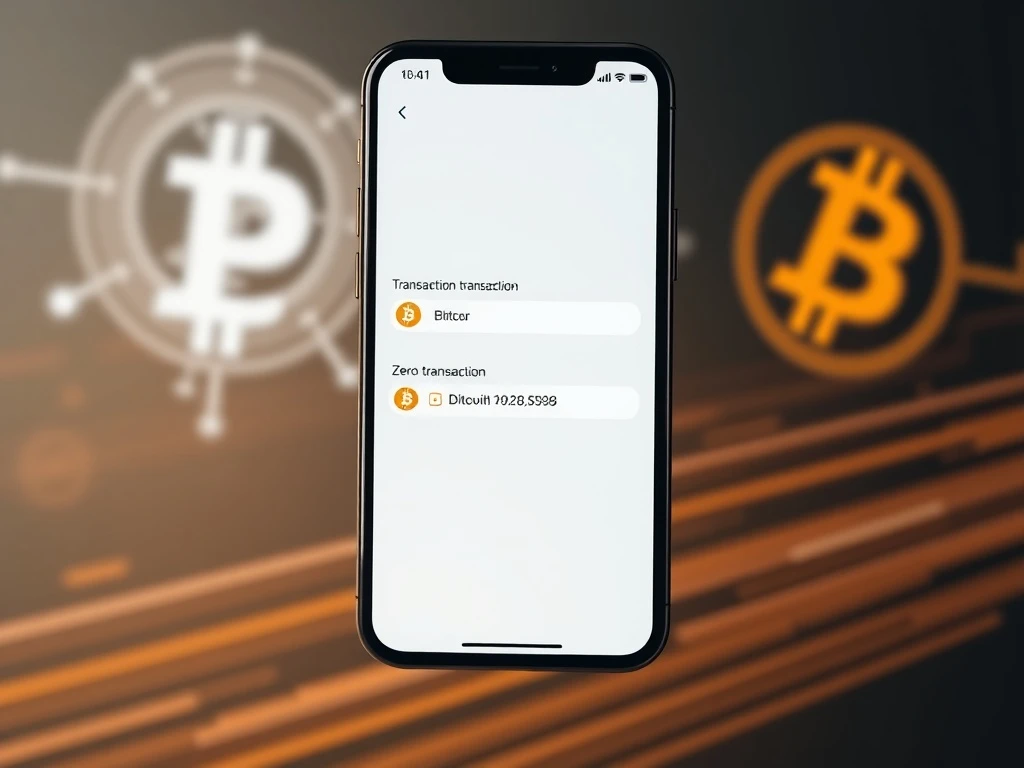StarkWare’s Breakthrough: Empowering Mobile Bitcoin Verification for Global Accessibility

A significant development is reshaping how users interact with the world’s leading cryptocurrency. **StarkWare Bitcoin verification** is now possible on mobile devices. This innovation addresses a long-standing challenge for Bitcoin users. It offers a lightweight, efficient way to verify transactions. This breakthrough simplifies the process for millions. It promises to enhance Bitcoin’s accessibility and adoption globally.
Revolutionizing **Mobile Bitcoin Verification**
StarkWare, a leader in zero-knowledge (ZK) technology, has unveiled a groundbreaking solution. They created a ZK verification of the Bitcoin (BTC) blockchain. This proof runs efficiently on mobile devices. Traditionally, verifying Bitcoin payments required downloading the entire blockchain history. This full ledger exceeds 680 gigabytes. Such a requirement often deterred average users. It also limited mobile interaction.
StarkWare’s new proof changes this paradigm. It contains all Bitcoin block headers from the genesis block to the present. However, it omits the full, detailed blockchain history. Each block header includes vital information. This data covers the Bitcoin software version, a reference to the previous block, a timestamp, block size, and the nonce. Crucially, this robust proof comes in at just 1 megabyte (MB) in size. It allows users to verify transactions rapidly. Verification occurs in under 100 milliseconds. Abdelhamid Bakhta, head of ecosystem at StarkWare, confirmed these details to Crypto News Insights. This speed and minimal data footprint are transformative for mobile users.
This lightweight client builds upon Simplified Payment Verification (SPV). Satoshi Nakamoto outlined SPV in the original Bitcoin whitepaper. SPV enables smaller, lightweight nodes to verify payments. They do this without downloading the entire ledger. StarkWare’s announcement carries significant weight. It allows any user to verify Bitcoin payments. They no longer need to set up a full Bitcoin node. Full nodes can cost between $300 to $1,000. Their installation can also be technically complex for many individuals. This development lowers the barrier to entry substantially. Consequently, it democratizes access to secure Bitcoin usage.
The Power of **ZK Proof Technology** for Bitcoin
Zero-knowledge proof technology stands at the heart of StarkWare’s innovation. ZK proofs enable one party to prove the truth of a statement to another. They do this without revealing any specific information about the statement itself. In the context of Bitcoin, this means a mobile device can confirm the validity of a transaction. It does this without processing the entire blockchain. This method ensures both privacy and efficiency. It maintains the cryptographic security inherent to Bitcoin.
The implications of this technology are vast. It could lead to a new era of Bitcoin applications. Developers can now build more secure and private mobile wallets. These wallets will offer robust verification capabilities. Users gain greater confidence in their transactions. They no longer rely on third-party services for verification. This enhances decentralization at the user level. Furthermore, ZK proofs are crucial for scaling solutions across various blockchain networks. Their application here demonstrates their versatility. They offer practical benefits for Bitcoin’s core functionality.
Addressing Challenges with **Bitcoin Nodes** and Decentralization
The requirements for running a Bitcoin node are often debated within the community. While generally more accessible than other blockchain networks, costs and technical expertise remain factors. Bitcoin nodes can run on retail personal computers. This is due to the protocol’s relative simplicity. It has generated approximately 680 gigabytes of data since 2009. This simplicity and accessible hardware are vital. They preserve the protocol’s decentralization. Independent node runners enforce Bitcoin’s consensus mechanism. If node operation becomes too expensive, the network risks centralization. Large service providers with ample resources could dominate. This outcome contradicts Bitcoin’s fundamental value proposition.
The number of Bitcoin nodes has shown a steady increase since 2015. This growth signifies a healthy network. However, recent developments have introduced new challenges. Inscriptions, ordinals, and other forms of non-monetary data storage are examples. Critics argue these increase the ledger size. They require node operators to store significant amounts of non-monetary data. This creates a centralization risk. Such data adds to the burden on node operators. It potentially pushes out smaller, independent participants.
A notable discussion revolves around the OP_Return limit. This limit caps non-monetary data embedded in Bitcoin transactions. Currently, it stands at 80 bytes. This size is too small for most images and multimedia content. Bitcoin Core, used by about 80% of BTC node runners, announced changes. The upcoming Bitcoin Core 30 update, slated for October, will remove this limit. This proposed change has sparked considerable debate. It has also prompted a historic surge in users running Bitcoin Knots nodes. Bitcoin Knots is an alternative Bitcoin node software. It offers more customizable parameters. Node runners can limit OP_Return data in their memory pools. They can also control what they relay to other nodes. This flexibility appeals to those concerned about ledger bloat. Consequently, Knots nodes now account for nearly 20% of the network in 2025. This marks a vertical increase from late 2024, when they held about 1% market share. These dynamics underscore the ongoing efforts to maintain Bitcoin’s core principles amidst evolving usage patterns.
Enhancing **Lightweight Bitcoin Client** Adoption and User Experience
StarkWare’s **lightweight Bitcoin client** represents a significant leap forward for user experience. It offers a practical solution to the growing ledger size problem. Users no longer need to compromise security for convenience. They can verify transactions quickly and reliably on their mobile devices. This expands Bitcoin’s utility beyond desktop environments. It makes it more accessible for everyday payments. Imagine verifying a Bitcoin transaction at a physical store using only your phone. This technology makes such scenarios a reality. It fosters greater confidence in direct peer-to-peer transactions.
Furthermore, this development aligns with the broader trend of mobile-first technology. As smartphone penetration increases globally, so does the potential for Bitcoin adoption. By simplifying the verification process, StarkWare is removing a key technical barrier. This could unlock new markets and user demographics. It empowers individuals in regions with limited access to powerful computing resources. They can now participate more fully in the Bitcoin economy. The focus remains on maintaining decentralization. Simultaneously, it promotes ease of use. This balance is critical for long-term growth.
The Future of **StarkWare Bitcoin Verification**
StarkWare’s innovation is more than just a technical achievement. It represents a strategic move towards a more inclusive Bitcoin ecosystem. By leveraging ZK proof technology, they are enhancing Bitcoin’s core value proposition. This includes security, decentralization, and accessibility. The ability to perform **StarkWare Bitcoin verification** on mobile devices opens new avenues. It encourages wider adoption and integration into daily life. This development shows how advanced cryptographic techniques can solve real-world problems. It helps maintain the integrity and usability of decentralized networks. As the crypto landscape evolves, such advancements are crucial. They ensure Bitcoin remains relevant and robust for future generations of users.










